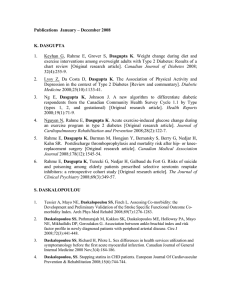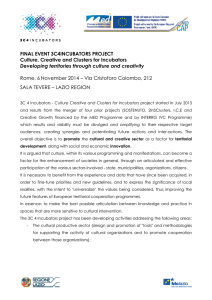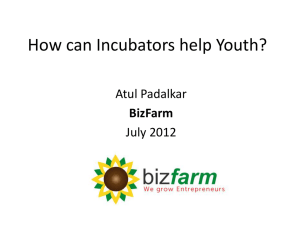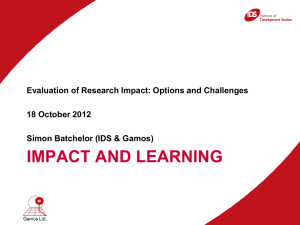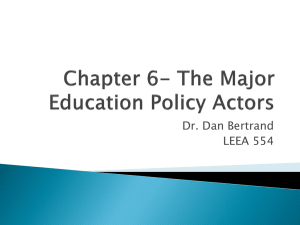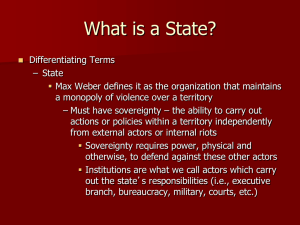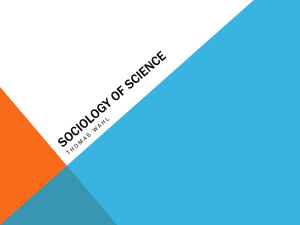Innovation Policy and Technology Transfer - BILAT-UKR
advertisement
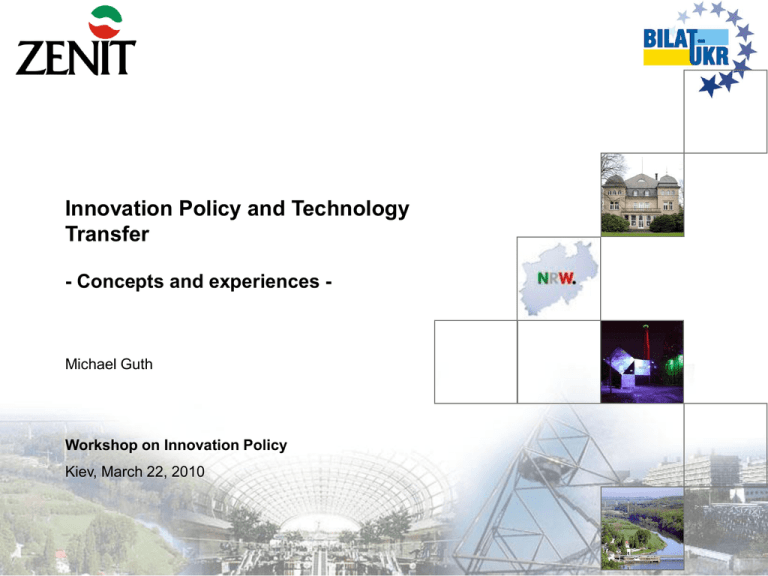
Innovation Policy and Technology Transfer - Concepts and experiences - Michael Guth Workshop on Innovation Policy Kiev, March 22, 2010 Contents 1. Concepts of innovation and technology transfer 2. Examples of transfer schemes 3.1 Cases from NRW 3.2 Examples from Romania (EU R&D FP/ national funding) 3.3 Business Incubators in Algeria 3. Summary and preliminary conclusions 2. Innovation and Technology Transfer Innovation can be defined as: 1) „the result of individual and institutional learning processes, the knowledge created by this and its economic application“ (ZENIT) 2) “Innovation is the ability to take new ideas and translate them into commercial outcomes by new processes, products or services….)1) We only speak about „innovation“ when new knowledge is actually being applied in new products, services, organisational procedures or management procedures!! 1) Nedis, R. and Byler E. (2009), Creating a national innovation framework, in Science progress April(2009) Transfer In this perspective technology (knowledge) transfer is key for innovation processes to take place! Technology Transfer and Innovation are two sides of one medal BUT How does Technology Transfer and Innovation (TTI) function?? The concept of innovation Traditionally the RTD&I systems both in market and in transition environments were (and still are!?) based on a rather linear way of thinking technology transfer/innovation Basic Research Applied Research Demonstration/ Feasibility Product Market The concept of innovation It is not that easy! Basic Research X Applied Research X Demonstration/ Feasibility Product X Market It is more complex: Elements of innovation are: Non – linear process Involving different actors (science, firms, governments, public) Complex feed back loops between the actors => Innovation is a system Innovation System Competitiveness Research Firms Supply Demand Gov. Institutions Growth What does this mean for Innovation Policy? Research may no longer be the only focus of science policy measures Pure technology aspects become less important Interaction of actors is equally important for the success of innovation policy (Transfer as critical element) A striking new element for policy measures are the links between actors! (Networks, Cluster, Exchange) This is why I am presenting in the following part selected examples for TT-schemes as well as some lessons deriving from that 3. Examples of TT schemes 3.1 Cases for TT schemes in North Rhine Westphalia ZukunftsWettbewerb Ruhrgebiet PFAU IPT Target SMEs + research institutions, network young start ups (prestarting phase) Know how transfer - joint projects - joint development - joint application of knowledge through “heads” young graduates bring university know how into new firms Max. 50% funding rate for winning projects via personnel costs -Max 60% of gross amounting to part-time annual salary placement at university - Max 12,750€ (male) + 5000€ for consultancy and 15,300€ (female) services Funding Project duration Selection process 1 – 3 years call/competition/ selection committee 2 years call/competition/ selection committee SME through “heads” 4 months – 1 year On-going proposal submission Lessons from NRW 1/2 ZukunftsWettbewerb Ruhrgebiet : Through the broad orientation all sectors benefited from this programme (not only the old industries). There had to be a “spirit of co-operation” between industry and research institutions. Where this spirit was lacking, projects faced problems in critical situations. PFAU: Due to the high rate of created start ups, stemming from the projects selected, a lot of new jobs could be created, with a small financial effort Most of the start ups were build near the respective university Regions without an university did not benefit from this tool Lessons from NRW 2/2 IPT: The personnel transfer (IPT) can also be seen as an instrument with a good cost-benefit ratio: Good instrument for regions with structural change For 40 % of firms the know how transfer was more important than the funding! Most of the young graduates (60 %) remained in the firm after the project (and funding) ceased (one year after the project’s end) Focus on SMEs 3.2 Examples from Romania • The use of the European FP for building up networks (RoDi) • A national financing scheme for TT infrastructures FP6 Project: Romanian Days of Innovation RoDI Partners: • RO Ministry of Education and Research • Research Institute for Automation Design (IPA), Bucharest • University of Agricultural Sciences in Bucharest • ZENIT • gtz (German technical assistance corporation) FP6 Project: Romanian Days of Innovation RoDI What was it all about? • Building up of two networks: IST and biotechnology • Promotion of FP6 and FP7 participation for RO researchers • Training seminars on FP 7 in all 8 regions • National FP6/FP7 conferences Sustainability and enhancement of the IST Network assured via a National Research Project: Prom IST PC7 Programme of the National Authority for Scientific Research in support of TTI infrastructures (INFRATECH): • Technology and Science Parks • Business Incubators • Technology Transfer Centres • Centres for Technology Information • Industry Liaison Offices • Technology Clusters and Brokers Infratech • • • 2 components: Institutional build up (1 year) Specific services (5 years) Budget: up to 500.000 EUR per project Network of Romanian TTI structures Lessons from Romania Exploiting synergies between EU and national resources! Networking is an important element for innovation. BUT: depending on the actual infrastructural endowment, the infrastructure up-grade must not be forgotten. Refrain from too strict legal codifications. A law is not really needed. Can be an obstacle in the implementation. Importance of a demand orientated approach. Not all > 60 TTI entities regard themselves as innovation service providers! Financial sustainability is a problem 3.3 Business Incubators in Algeria • National law for building up and financing incubators (4 years) • No real activity so far. Introduction of the topic into the German-ALG technical cooperation agreement (ALG Ministry and GTZ) • ZENIT selected as process consultant • Decision of ALG Ministry to focus on incubators for technology based start ups One year from project start to begin of the implementation Lancement Conception SWOT Atelier de lancement à Alger (Ministère, Régions) Élaboration du concept (brouillon) Déroulement Concept (Accord) Plan de déroulement Pilote 1 Pilote 1 Pilote 1 Pilote 1 Pilote 2 Pilote 2 Pilote 2 Pilote 2 Pilote 3 Pilote 3 Pilote 3 Pilote 3 (Monitoring) Supervision & Évaluation Échange d‘expériences Pilote 1 Atelier Alger (Ministère, 3 Pilotes) Pilote 2 Pilote 3 Lessons from Algeria? Is a bit early! For comprehensive lessons “Codification of TT infrastructures in a (national) law again turned out to be a hindrance factor for efficient implementation” “Also: good networking (locally/nationally) requires sufficient knot points: minimum level of TT-infrastructural endowment is necessary” “Money (from the law), actors (local gov., univ. + business organisations) and certain problem pressure (high unemployment) were not sufficient for getting the process started. A trigger from a “fourth force” (process consultant) was necessary” 4. Summary and Conclusions Innovation without Technology/Know how transfer is not possible! TT represents a key element of innovation policy (different motivations of the actors) We must not expect too much (financially, technologically) Incremental but permanent flows of knowledge and subsequent application may not be so appealing but still they are very efficient This has consequences for TT-schemes: smaller projects, broad approaches (technologically), involving people (transfer through heads, networks, local clusters, …) Specific Transition aspects? Most of the points discussed are general! They apply for Germany as much as for Ukraine Legal framework is an issue! Transition states tend to codify too much (national law for incubators, national cluster law, …): Think twice before you issue a new law in the TTI-field Networking (triple helix) versus bad-buddy-groups (closed shops, nepotism, cartels/trusts): Organise broad participation – even on the cost of efficiency. Identify project forms which create local/regional network (RIS, foresights, benchmarking workshops) Thank you very much for your attention! Contact: Michael Guth Phone ++49-208-30004-56 Mail: mg(at)zenit.de
